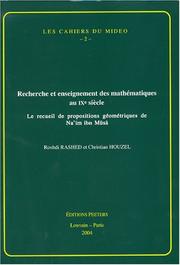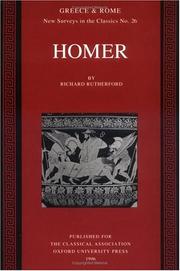| Listing 1 - 10 of 26 | << page >> |
Sort by
|
Book
ISBN: 3412527300 9783412527303 Year: 2022 Publisher: Wien: Köln: Böhlau,
Abstract | Keywords | Export | Availability | Bookmark
 Loading...
Loading...Choose an application
- Reference Manager
- EndNote
- RefWorks (Direct export to RefWorks)
Die Papstgeschichte des Fruhmittelalters ist stark fokussiert auf den Papst selbst, seine Aktionen und Reaktionen. Die Wirksamkeit des Papsttums wurde aber bereits im ersten Jahrtausend bestimmt von Personennetzwerken, Relationen und Personengeflechten. Wer diese Personen, die sozusagen in der zweiten Reihe wirkten, eigentlich waren, wird in dem prosopographischen Handbuch dargestellt. Samtliche Personen, die im 9. Jahrhundert in papstlichem Auftrag tatig waren oder in der Umgebung des Papstes wirkten, werden mit ihrer Biographie und ihren Tatigkeiten prasentiert. Das Buch zeigt auf, wie das papstliche Handeln und die Herrschaft in der Zeit zwischen der Kaiserkronung Karls des Grossen und dem Ende der Karolingerzeit in Rom und in der christlichen Welt funktionierten.
Vatican --- Prosopographie --- 9e siècle
Book
ISBN: 3886120325 9783886120321 Year: 1994 Volume: 4 Publisher: München: Monumenta Germaniae historica,
Abstract | Keywords | Export | Availability | Bookmark
 Loading...
Loading...Choose an application
- Reference Manager
- EndNote
- RefWorks (Direct export to RefWorks)
Book
ISBN: 9788833812328 8833812324 9788833812335 8833812332 Year: 2020 Publisher: Roma: Efesto,
Abstract | Keywords | Export | Availability | Bookmark
 Loading...
Loading...Choose an application
- Reference Manager
- EndNote
- RefWorks (Direct export to RefWorks)
Paschalis I p. --- Roma --- 9e siècle --- Epigraphie --- Santa Prassede (Roma) --- S. Prassede (Roma)
Book
ISBN: 2251661174 9782251661179 Year: 1949 Volume: 117 Publisher: Paris: Les Belles Lettres,
Abstract | Keywords | Export | Availability | Bookmark
 Loading...
Loading...Choose an application
- Reference Manager
- EndNote
- RefWorks (Direct export to RefWorks)
Homer --- Plato --- Homere, poete epique grec, vers le 9e siecle av. j.-c. --- Platon (428-348 av. j.c.) --- Influence --- Platon
Book
ISBN: 2130388108 9782130388104 Year: 1985 Volume: 2218 Publisher: Paris: PUF,
Abstract | Keywords | Export | Availability | Bookmark
 Loading...
Loading...Choose an application
- Reference Manager
- EndNote
- RefWorks (Direct export to RefWorks)
Homer --- Criticism and interpretation --- Critique et interprétation --- 87.09 HOMERUS --- 875 HOMERUS --- Désherbage --- Deselectie --- Critique et interprétation --- Homère --- Homerus. --- Criticism and interpretation. --- Homere, poete epique grec, vers le 9e siecle av. j.-c. --- Critique et interpretation
Book
ISBN: 9782842874902 2842874900 Year: 2009 Volume: 1 Publisher: Limoges: PULIM,
Abstract | Keywords | Export | Availability | Bookmark
 Loading...
Loading...Choose an application
- Reference Manager
- EndNote
- RefWorks (Direct export to RefWorks)
Fonds Jean-Marie Duvosquel
Diplomatique --- --Louis, --- publication de sources --- --Franks --- Franks --- Francs --- History --- Histoire --- Ludwig, --- Louis --- Germany --- Allemagne --- Politique et gouvernement --- --Diplomatique --- 843-918 --- Sources --- Louis I, 814-840 --- --Germany --- Louis, 806-876 --- Actes royaux --- Empire carolingien --- 814-840 (Louis Ier) --- 9e siècle --- 9e siècle
Book
ISBN: 0520022459 9780520022454 Year: 1974 Publisher: Berkeley (Calif.): University of California press,
Abstract | Keywords | Export | Availability | Bookmark
 Loading...
Loading...Choose an application
- Reference Manager
- EndNote
- RefWorks (Direct export to RefWorks)
Book history --- printing presses --- book history --- anno 1500-1799 --- anno 1400-1499 --- anno 1800-1999 --- Printing presses --- -Presses, Printing --- Printing-press --- Power presses --- Printing machinery and supplies --- Oral-formulaic analysis. --- Homer --- History --- Epic poetry, Greek --- Oral tradition --- Rhetoric, Ancient. --- History and criticism. --- Greece. --- Technique. --- Printing presses - History --- -History --- Homere, poete epique grec, vers le 9e siecle av. j.-c. --- Critique et interpretation

ISBN: 9042914963 2877238083 9789042914964 Year: 2004 Volume: 2 Publisher: Leuven: Peeters,
Abstract | Keywords | Export | Availability | Bookmark
 Loading...
Loading...Choose an application
- Reference Manager
- EndNote
- RefWorks (Direct export to RefWorks)
Geschiedenis van de wetenschappen --- Histoire des sciences --- Mathématiques --- Wiskunde --- Mathematics, Arab --- Mathematics, Medieval --- Geometry --- Mathematics, Arab. --- Mathematics, Medieval. --- Medieval mathematics --- Arab mathematics --- Mathematics, Arabic --- Mathematics, Greek --- Mathematics, Arab - Early works to 1800 --- Geometry - Early works to 1800 --- Ibn Mūsā , Naʿīm ibn Muḥammad (08..?-09..?) --- Mathématiques arabes --- Géométrie --- Critique et interprétation --- Ouvrages avant 1800 --- 9e siècle --- Ibn Mūsā , Naʿīm ibn Muḥammad (08..?-09..?) --- Mathématiques arabes --- Géométrie --- Critique et interprétation --- 9e siècle
Book
ISBN: 0226706524 9780226706528 Year: 1975 Publisher: Chicago (Ill.): University of Chicago press,
Abstract | Keywords | Export | Availability | Bookmark
 Loading...
Loading...Choose an application
- Reference Manager
- EndNote
- RefWorks (Direct export to RefWorks)
Hector --- Hector (Legendary character) in literature --- Epic poetry, Greek --- Achilles (Greek mythology) in literature --- Trojan War --- Princes in literature --- Tragic, The --- History and criticism --- Literature and the war --- Homer. --- Homer --- Characters --- Knowledge --- Troy (Extinct city) --- In literature --- Epic poetry, Greek - History and criticism --- Trojan War - Literature and the war --- Homer - Iliad --- Homer - Characters - Hector --- Homer - Knowledge - Troy (Extinct city) --- Troy (Extinct city) - In literature --- Homere, poete epique grec, vers le 9e siecle av. j.-c. --- Iliade --- Sociologie de la litterature

ISBN: 0199222096 9780199222094 0715632825 1472539826 1849667462 1849667500 1849667497 Year: 1996 Volume: 26 Publisher: Oxford: Oxford university press,
Abstract | Keywords | Export | Availability | Bookmark
 Loading...
Loading...Choose an application
- Reference Manager
- EndNote
- RefWorks (Direct export to RefWorks)
This book offers a new approach to the study of Homeric epic by combining ancient Greek perceptions of Homer with up-to-date scholarship on traditional poetry. Part I argues that, in the archaic period, the Greeks saw the lliad and Odyssey neither as literary works in the modern sense nor as the products of oral poetry. Instead, they regarded them as belonging to a much wider history of the divine cosmos, whose structures and themes are reflected in the resonant patterns of Homer's traditional language and narrative techniques. Part II illustrates this claim by looking at some central aspects of the Homeric poems: the gods and fate, gender and society, death, fame and poetry. Each section shows how the patterns and preoccupations of Homeric storytelling reflect a historical vision that encompasses the making of the universe, from its beginnings when Heaven mated with Earth, to the present day
Homer --- Epic poetry, Greek --- History and criticism. --- History and criticism --- Homer. --- Homerus. --- Homeros --- Homère --- Criticism and interpretation. --- Homerus --- Hóiméar --- Hūmīrūs --- Gomer --- Omir --- Omer --- Omero --- Ho-ma --- Homa --- Homérosz --- האמער --- הומירוס --- הומר --- הומרוס --- هومر --- هوميروس --- 荷马 --- Ὅμηρος --- Гамэр --- Hamėr --- Омир --- Homero --- 호메로스 --- Homerosŭ --- Homērs --- Homeras --- Хомер --- ホメーロス --- ホメロス --- Гомер --- Homeri --- Hema --- Pseudo-Homer --- Pseudo Omero --- Epic poetry, Greek - History and criticism. --- Homere, poete epique grec, vers le 9e siecle av. j.-c. --- Critique et interpretation --- Appreciation
| Listing 1 - 10 of 26 | << page >> |
Sort by
|

 Search
Search Feedback
Feedback About UniCat
About UniCat  Help
Help News
News